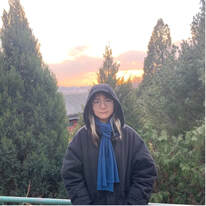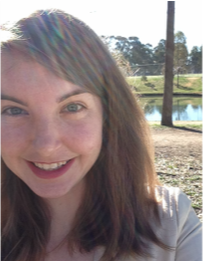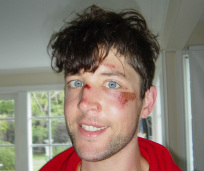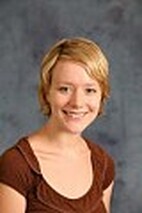Current lab members
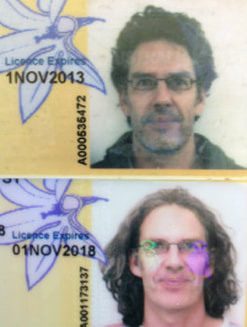
Michael Jennions (Lab Leader, and random thought generator)
I was born in Manchester (we all make mistakes when young!) but I grew up in South Africa in the 1970's and 80's during the death rattles of apartheid. My MSc at Wits University was on sperm competition in frogs. I designed a frog condom. Yes I did! I then did a PhD in England (1992-96). I was set to work on meerkats but ended up studying crabs, birds & frogs with wonderful supervision by Marion Petrie. In 1996, I moved to STRI in Panama. Unemployed, I learned the pleasures of sundowners and how to fall off a motorbike. In late 1997 my unemployment ended with a Tupper Fellowship (1997-2000). I worked on parental care/desertion in cichlids & life history evolution in a live-bearing fish. We arrived in Australia in 2001. Here I have worked on crickets and mosquitofish and humans. I have also spilled ink on theoretical issues with Hanna Kokko and Lutz Fromhage. I was involved with an NCEAS group on meta-analysis in ecology/evolution. For more info see my RSB staff Profile. Otherwise, my publications are at: Google Scholar Citations or Researcher ID. In my spare time I read crime novels, go to the pub for a beer ('only one' is code for 'definitely two'), and obsessively walk 10 000 steps/day to negate the other activities. That's life. (Find my publications with PDFs HERE).
I was born in Manchester (we all make mistakes when young!) but I grew up in South Africa in the 1970's and 80's during the death rattles of apartheid. My MSc at Wits University was on sperm competition in frogs. I designed a frog condom. Yes I did! I then did a PhD in England (1992-96). I was set to work on meerkats but ended up studying crabs, birds & frogs with wonderful supervision by Marion Petrie. In 1996, I moved to STRI in Panama. Unemployed, I learned the pleasures of sundowners and how to fall off a motorbike. In late 1997 my unemployment ended with a Tupper Fellowship (1997-2000). I worked on parental care/desertion in cichlids & life history evolution in a live-bearing fish. We arrived in Australia in 2001. Here I have worked on crickets and mosquitofish and humans. I have also spilled ink on theoretical issues with Hanna Kokko and Lutz Fromhage. I was involved with an NCEAS group on meta-analysis in ecology/evolution. For more info see my RSB staff Profile. Otherwise, my publications are at: Google Scholar Citations or Researcher ID. In my spare time I read crime novels, go to the pub for a beer ('only one' is code for 'definitely two'), and obsessively walk 10 000 steps/day to negate the other activities. That's life. (Find my publications with PDFs HERE).
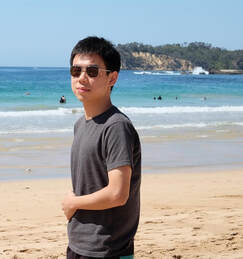
Meng-Han (Joseph) Chung (Current Post-doc)
Joe's website (click here for more info and pretty pictures)
I completed my bachelor’s degree at the National Chung Hsing University in Taiwan and gained a foundation in osmotic regulation and aerobic metabolism of euryhaline fish. I also accumulated some practical experience working at fish farms and an aquaculture research center to learn how to modify rearing strategies by observing behavioural differences among fishes. The experience sparked my interest in linking my physiology knowledge with the role that behaviour may play in stress adaptation. In my PhD programme, I studied how a stressor (salinity) regulates fish’s body conditions and behaviors (locomotion, mating preference) and further change their fitness in a new environment. I also looked at genital function and the costs of sperm production and mating effort in Gambusia. To see publications from my PhD please go to the J-lab publications (papers 249 & 252 & 259, 281). There are at three more papers to come; plus others from side projects. For more info: Joe's website
Joe's website (click here for more info and pretty pictures)
I completed my bachelor’s degree at the National Chung Hsing University in Taiwan and gained a foundation in osmotic regulation and aerobic metabolism of euryhaline fish. I also accumulated some practical experience working at fish farms and an aquaculture research center to learn how to modify rearing strategies by observing behavioural differences among fishes. The experience sparked my interest in linking my physiology knowledge with the role that behaviour may play in stress adaptation. In my PhD programme, I studied how a stressor (salinity) regulates fish’s body conditions and behaviors (locomotion, mating preference) and further change their fitness in a new environment. I also looked at genital function and the costs of sperm production and mating effort in Gambusia. To see publications from my PhD please go to the J-lab publications (papers 249 & 252 & 259, 281). There are at three more papers to come; plus others from side projects. For more info: Joe's website
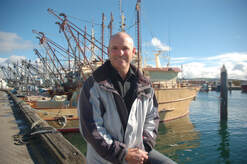
David Ellis (PhD Student)
I have loved the water for as long as I can remember. Whether it was catching frogs and tadpoles in the creek next door that fed the River Torrens in Adelaide, rustling up a feed of yabbies and fish from the River Murray, or exploring the marine environment. I was one of the first grads in the Australian aquaculture industry in the early 90’s. Since then, I have worked and researched in various seafood sectors (salmon, mussels, pearls, abalone, oysters, kingfish, and tuna) from the temperate south to the tropical north in sustainable seafood production and harvesting. However, I now find myself doing an awesome PhD on marine ecology at Ningaloo for fun, when people my age are usually buying Harley Davidson
I have loved the water for as long as I can remember. Whether it was catching frogs and tadpoles in the creek next door that fed the River Torrens in Adelaide, rustling up a feed of yabbies and fish from the River Murray, or exploring the marine environment. I was one of the first grads in the Australian aquaculture industry in the early 90’s. Since then, I have worked and researched in various seafood sectors (salmon, mussels, pearls, abalone, oysters, kingfish, and tuna) from the temperate south to the tropical north in sustainable seafood production and harvesting. However, I now find myself doing an awesome PhD on marine ecology at Ningaloo for fun, when people my age are usually buying Harley Davidson
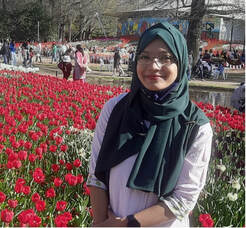
Fatema Akhter (PhD student; co-supervised by Megan Head (website).
I was born in a beautiful city in Bangladesh. I completed my Bachelor of Science in Fisheries from Chittagong Veterinary & Animal Sciences University (CVASU), Bangladesh and for my undergraduate result, I received the prestigious University Gold Medal and Dean’s Award. I completed my Master’s Degree in Fish Biology and Biotechnology from the same uni. Being in love with teaching I started my career as a Lecturer in the Dept. of Fish Biology & Biotechnology, CVASU, and served in that position from November 2017 to August 2022 (currently I am on study leave). From the very beginning of my career, I worked with fish and have done much work in the field of reproductive biology and physiology of fishes, although I had interests in their behavioral biology. For my Ph.D., I am working on sexual conflict in Mosquitofishes and how environmental manipulation modulates the level of conflict among them. I would like to develop my skill in the area of behavioral biology and expertise in this area in the future after returning back to my country.
I was born in a beautiful city in Bangladesh. I completed my Bachelor of Science in Fisheries from Chittagong Veterinary & Animal Sciences University (CVASU), Bangladesh and for my undergraduate result, I received the prestigious University Gold Medal and Dean’s Award. I completed my Master’s Degree in Fish Biology and Biotechnology from the same uni. Being in love with teaching I started my career as a Lecturer in the Dept. of Fish Biology & Biotechnology, CVASU, and served in that position from November 2017 to August 2022 (currently I am on study leave). From the very beginning of my career, I worked with fish and have done much work in the field of reproductive biology and physiology of fishes, although I had interests in their behavioral biology. For my Ph.D., I am working on sexual conflict in Mosquitofishes and how environmental manipulation modulates the level of conflict among them. I would like to develop my skill in the area of behavioral biology and expertise in this area in the future after returning back to my country.
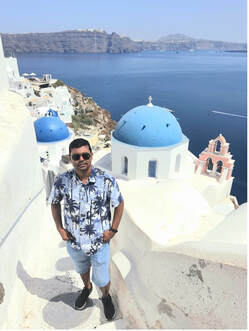
Md Mahmud Al Hasan (PhD student; co-supervised by Megan Head (website).
I grew up in Bangladesh, where I completed my Bachelor's degree in Fisheries and Marine Resource Technology discipline. My main area of research is the stress response in organisms. During my undergraduate studies, I worked with microalgae to investigate how stress can induce the production of biofuels. I also took part in various research projects, including the study of morphometrics in mud crabs, behavior and sexual traits in Guppies and Stinging catfish. Afterward, I moved to Germany (DAAD scholar) to do my Masters in Aquatic Ecology from the University of Bremen. While there, I conducted research on thermal stress physiology of European Seabass juveniles. Currently, I am working on my PhD, which focuses on how inbreeding affects the response to early-life thermal stress in Guppy fish. I am interested in both the behavior and the physiological mechanisms behind this response. In my free time, I enjoy traveling and have a long list of destinations I still hope to visit. I also enjoy playing cricket, football and watching psychological thriller movies.
I grew up in Bangladesh, where I completed my Bachelor's degree in Fisheries and Marine Resource Technology discipline. My main area of research is the stress response in organisms. During my undergraduate studies, I worked with microalgae to investigate how stress can induce the production of biofuels. I also took part in various research projects, including the study of morphometrics in mud crabs, behavior and sexual traits in Guppies and Stinging catfish. Afterward, I moved to Germany (DAAD scholar) to do my Masters in Aquatic Ecology from the University of Bremen. While there, I conducted research on thermal stress physiology of European Seabass juveniles. Currently, I am working on my PhD, which focuses on how inbreeding affects the response to early-life thermal stress in Guppy fish. I am interested in both the behavior and the physiological mechanisms behind this response. In my free time, I enjoy traveling and have a long list of destinations I still hope to visit. I also enjoy playing cricket, football and watching psychological thriller movies.
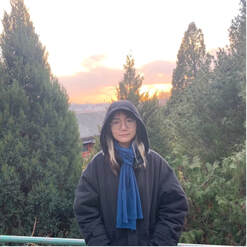
Chenke Zang (PhD student)
I was born and raised in China, where I spent the first two year of my bachelor’s degree. After that, I completed my joint bachelor’s degree in biotechnology at the Australian National University. I have always been captivated by the animal kingdom and the intricate behaviour of animals. After studying remotely at home for two years, I finally got the chance to move to Canberra and joined Michael’s group. During my time here, I have been able to work on a range of research projects, including investigating inbreeding depression on cognition and the winner-loser effect. I am constantly striving to broaden my knowledge and skills, and I have been truly inspired by the amazing people I have met at the lab. I finished my MSc in 2023, and will start my PhD at ANU in 2024.
I was born and raised in China, where I spent the first two year of my bachelor’s degree. After that, I completed my joint bachelor’s degree in biotechnology at the Australian National University. I have always been captivated by the animal kingdom and the intricate behaviour of animals. After studying remotely at home for two years, I finally got the chance to move to Canberra and joined Michael’s group. During my time here, I have been able to work on a range of research projects, including investigating inbreeding depression on cognition and the winner-loser effect. I am constantly striving to broaden my knowledge and skills, and I have been truly inspired by the amazing people I have met at the lab. I finished my MSc in 2023, and will start my PhD at ANU in 2024.
Former Postdocs, fellows and long-term visitors
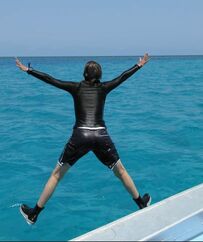
Rebecca Fox (Lab post-doc / agony aunt / rule-maker)
Originally from the UK, I have found my way via a circuitous route (British Government economist, Private Secretary to the UK Chancellor, marine biology graduate) to the J-lab. I received my PhD in 2013 from James Cook University for research into the behavioural and functional ecology of herbivorous fishes on coral reefs. In 2015 I took a post-doc at the University of Technology, Sydney studying the mating behaviour of reef fishes (rabbitfishes) and the behaviour of juvenile “vagrant” tropical fishes that are transported to temperate waters around Sydney each year via the East Australian Current. As of Jan 2018 I have moved to the J-lab. Aside from my ongoing interest in marine fish and phenotypic plasticity, I am now up to speed on the mating behaviour of mosquitofish. Otherwise, I try to keep up with Mike’s random thoughts.
Bec's webpage Email me
Originally from the UK, I have found my way via a circuitous route (British Government economist, Private Secretary to the UK Chancellor, marine biology graduate) to the J-lab. I received my PhD in 2013 from James Cook University for research into the behavioural and functional ecology of herbivorous fishes on coral reefs. In 2015 I took a post-doc at the University of Technology, Sydney studying the mating behaviour of reef fishes (rabbitfishes) and the behaviour of juvenile “vagrant” tropical fishes that are transported to temperate waters around Sydney each year via the East Australian Current. As of Jan 2018 I have moved to the J-lab. Aside from my ongoing interest in marine fish and phenotypic plasticity, I am now up to speed on the mating behaviour of mosquitofish. Otherwise, I try to keep up with Mike’s random thoughts.
Bec's webpage Email me
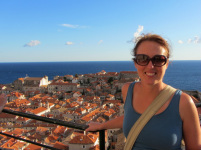
Megan Head (ARC Future Fellow)
Megan did her PhD at the University of New South Wales with Rob Brooks and went on to post-docs in the UK (Nick Royle, Iain Barber) and USA (Jenny Boughman). She was J-lab post-doc from October 2013 until 2017 when she won an ARC Future Fellowship and has now set up her own lab at the ANU. Megan and Mike still collaborate on many projects and co-supervise students (see above). To find out more about Megan check out her webpage Email me
Megan did her PhD at the University of New South Wales with Rob Brooks and went on to post-docs in the UK (Nick Royle, Iain Barber) and USA (Jenny Boughman). She was J-lab post-doc from October 2013 until 2017 when she won an ARC Future Fellowship and has now set up her own lab at the ANU. Megan and Mike still collaborate on many projects and co-supervise students (see above). To find out more about Megan check out her webpage Email me
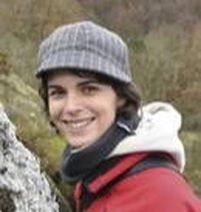
Maider Iglesias Carrasco (Research Fellow)
I visited the J-lab in 2015 from the Aranzadi Society of Science (Herpetologia Division) whilst writing up my PhD, which was awarded in 2017. I returned to the J-lab in 2018 as a Visiting Fellow to run further experiments. In July 2018 I crossed the Tasman to take up an Endeavour Postdoctoral Fellowship with Dr Kristal Cain at the University of Aukland, looking at how diet affects corticosterone levels in Hihi chicks. I then went back toat the ANU and completed a post-doc co-hosted by Megan Head and Michael. I am now on a post-doc based in Seville, Spain.
Email me
I visited the J-lab in 2015 from the Aranzadi Society of Science (Herpetologia Division) whilst writing up my PhD, which was awarded in 2017. I returned to the J-lab in 2018 as a Visiting Fellow to run further experiments. In July 2018 I crossed the Tasman to take up an Endeavour Postdoctoral Fellowship with Dr Kristal Cain at the University of Aukland, looking at how diet affects corticosterone levels in Hihi chicks. I then went back toat the ANU and completed a post-doc co-hosted by Megan Head and Michael. I am now on a post-doc based in Seville, Spain.
Email me
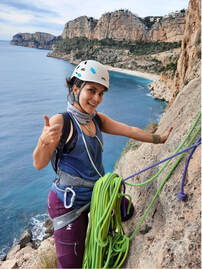
Claudia Londono (Visiting Fellow)
I grew up in Colombia. While studying biology, I developed a strong interest in animal behavior and ecology after spending a lot of time in the wild observing the association patterns of spider and howler monkeys. After finishing my degree, I also got some experience working on aquatic communities and environmental management. I continued to explore my curiosity about how natural factors influence animal behaviors during my Master’s degree in Spain, where I focused on animal welfare in lizards. After working in environmental consulting in Colombia for a few years, I returned to Spain to pursue my PhD. My current research involves studying the ecology of sexual conflict. This time I am working with fruit flies! Specifically, I am studying how temperature affects the male harm to females in Drosophila melanogaster. I am currently visiting the J Lab as part of my PhD program.
I grew up in Colombia. While studying biology, I developed a strong interest in animal behavior and ecology after spending a lot of time in the wild observing the association patterns of spider and howler monkeys. After finishing my degree, I also got some experience working on aquatic communities and environmental management. I continued to explore my curiosity about how natural factors influence animal behaviors during my Master’s degree in Spain, where I focused on animal welfare in lizards. After working in environmental consulting in Colombia for a few years, I returned to Spain to pursue my PhD. My current research involves studying the ecology of sexual conflict. This time I am working with fruit flies! Specifically, I am studying how temperature affects the male harm to females in Drosophila melanogaster. I am currently visiting the J Lab as part of my PhD program.
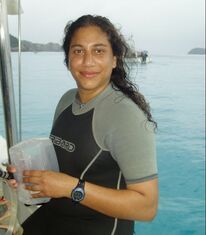
Jennie Mallela (ARC Post-doc)
I grew up in Birmingham in the UK, our claim to fame being that we have more canals than Venice and Steel Pulse (a UK based reggae band). I completed a BSc Hons at the University of Leeds and an MSc in Marine Resource Management with Heriot-Watt University where I spent a year living on the Orkney Islands. I fell in love with diving with seals whilst swimming through second world war shipwrecks. Currently I’m motivated by an interest in how past, present and future environmental disturbances (natural and anthropogenic) influence reef resilience and biological reef building processes (e.g. coral recruitment, calcification and erosion). My PhD fieldwork was in Jamaica, where I learnt to play a mean hand of dominoes and fell in love with Caribbean music. For my research I developed a biological carbonate budget model to assess how river runoff influenced rates and styles of reef development and growth. I am now an ARC DECRA Fellow within Michael's lab focusing on reconstructing long-term environmental change and documenting effects on coral reef organisms on the Great Barrier Reef. Jennie's webpage. Email me
I grew up in Birmingham in the UK, our claim to fame being that we have more canals than Venice and Steel Pulse (a UK based reggae band). I completed a BSc Hons at the University of Leeds and an MSc in Marine Resource Management with Heriot-Watt University where I spent a year living on the Orkney Islands. I fell in love with diving with seals whilst swimming through second world war shipwrecks. Currently I’m motivated by an interest in how past, present and future environmental disturbances (natural and anthropogenic) influence reef resilience and biological reef building processes (e.g. coral recruitment, calcification and erosion). My PhD fieldwork was in Jamaica, where I learnt to play a mean hand of dominoes and fell in love with Caribbean music. For my research I developed a biological carbonate budget model to assess how river runoff influenced rates and styles of reef development and growth. I am now an ARC DECRA Fellow within Michael's lab focusing on reconstructing long-term environmental change and documenting effects on coral reef organisms on the Great Barrier Reef. Jennie's webpage. Email me
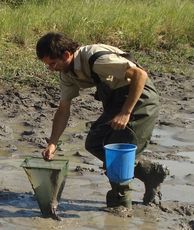
Milan Vrtilek (Endeavour Post-doc)
I studied and spent most of my academic career in Brno (Czech Republic) in the group of Martin Reichard, not far from the Abbey where Gregor Mendel used to grow his peas. I always loved fish though and started with host-choice experiments in European bitterling, a fish spawning into live mussels. Then I moved onto life-history evolution of African annual killifish, mainly the reproductive allocation and senescence in wild populations from southern Mozambique. Natural variation in size of killifish eggs brought me to study energetic constraints during their extended embryonic period. In the Jennions Lab, I am focusing on analysis of publication ethics and on of parental effects and am also conducting an experiment with seed beetles…..Back to legumes!
I studied and spent most of my academic career in Brno (Czech Republic) in the group of Martin Reichard, not far from the Abbey where Gregor Mendel used to grow his peas. I always loved fish though and started with host-choice experiments in European bitterling, a fish spawning into live mussels. Then I moved onto life-history evolution of African annual killifish, mainly the reproductive allocation and senescence in wild populations from southern Mozambique. Natural variation in size of killifish eggs brought me to study energetic constraints during their extended embryonic period. In the Jennions Lab, I am focusing on analysis of publication ethics and on of parental effects and am also conducting an experiment with seed beetles…..Back to legumes!
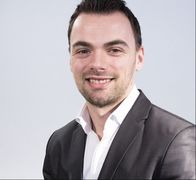
Pierre Chuard (Endeavour Post-doc)
I grew up in Besançon, France, but moved to the French Americas (Montreal, Canada) in 2008 where I obtained all my higher education, along with a strange accent in both English and French. Before completing my PhD under Profs. James Grant and Grant Brown (I know!) in May 2017 on the determinants of intraspecific competitive patterns in wild Trinidadian guppies, I completed a 7-mth “pre”-doc in Northern Iceland under Prof. Stefán Steingrímsson supervision. We focused on the effects of interspecific competition and water velocity on diurnal activity patterns in 3 sympatric species of salmonids. I am currently on a break from another postdoctoral fellowship at McGill University, Montreal, in Prof. Frédéric Guichard’s laboratory. We are looking at the effects of ocean acidification on box-jellyfish survival in the Caribbean Sea in Panama. In the J-lab, I am working on 3 different projects: a meta-analysis about reverse p-hacking, an experiment involving maternal and environmental effects on seed beetle offspring fitness, and another meta-analysis on how parental age affects offspring performance.
I grew up in Besançon, France, but moved to the French Americas (Montreal, Canada) in 2008 where I obtained all my higher education, along with a strange accent in both English and French. Before completing my PhD under Profs. James Grant and Grant Brown (I know!) in May 2017 on the determinants of intraspecific competitive patterns in wild Trinidadian guppies, I completed a 7-mth “pre”-doc in Northern Iceland under Prof. Stefán Steingrímsson supervision. We focused on the effects of interspecific competition and water velocity on diurnal activity patterns in 3 sympatric species of salmonids. I am currently on a break from another postdoctoral fellowship at McGill University, Montreal, in Prof. Frédéric Guichard’s laboratory. We are looking at the effects of ocean acidification on box-jellyfish survival in the Caribbean Sea in Panama. In the J-lab, I am working on 3 different projects: a meta-analysis about reverse p-hacking, an experiment involving maternal and environmental effects on seed beetle offspring fitness, and another meta-analysis on how parental age affects offspring performance.
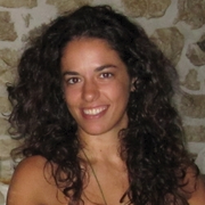
Foteini Spagopoulou (Visiting Fellow)
I am visiting from Uppsala where I am doing my PhD with Alexei Maklakov. While in the J Lab I will be working with Regina and Megan on a project looking at social effects on sperm production and, more importantly, the actual ability to gain paternity. Email me
I am visiting from Uppsala where I am doing my PhD with Alexei Maklakov. While in the J Lab I will be working with Regina and Megan on a project looking at social effects on sperm production and, more importantly, the actual ability to gain paternity. Email me
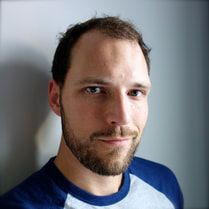
Luke Holman (ARC Post-doc)
Luke was formerly part of Hanna Kokko's group, but with Hanna's departure and, more importantly, the award of an ARC DECRA, Luke was flying solo. Even so, Luke needed a lab to be attached to, so that there were people to give him hugs. Hence he became part of the J-lab. For Luke's many interesting papers on ants, eusociality, sexual selection, genomic imprinting, pheromones and so much more, check out Luke's webpage Email me
UPDATE - Luke is now at Napier University in Scotland.
Luke was formerly part of Hanna Kokko's group, but with Hanna's departure and, more importantly, the award of an ARC DECRA, Luke was flying solo. Even so, Luke needed a lab to be attached to, so that there were people to give him hugs. Hence he became part of the J-lab. For Luke's many interesting papers on ants, eusociality, sexual selection, genomic imprinting, pheromones and so much more, check out Luke's webpage Email me
UPDATE - Luke is now at Napier University in Scotland.
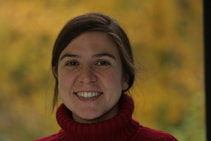
Saleta Perez Vila (Visiting Fellow)
Saleta was a Visiting Fellow with the J-lab from 2014-2017. She is interested in the evolution of species interactions by integrating evolutionary biology and community ecology, focusing on. a parasitoid-parasite-host system. I use the Nasonia genus as parasitoids and Protocalliphora (among other blowflies), that parasitize young birds in the nest.
Saleta was a Visiting Fellow with the J-lab from 2014-2017. She is interested in the evolution of species interactions by integrating evolutionary biology and community ecology, focusing on. a parasitoid-parasite-host system. I use the Nasonia genus as parasitoids and Protocalliphora (among other blowflies), that parasitize young birds in the nest.
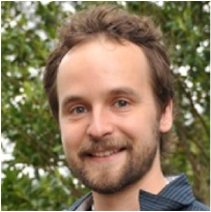
Sasha Mikheyev (Visiting Fellow)
Sasha was a J-lab Visiting Fellow from 2015-2017. He is based between the Okinawa Institute of Science and Technology (OIST) in Japan and ANU where he has recently (mid-2018) been appointed as a lecturer. Congratulations Sasha! Email me
Sasha was a J-lab Visiting Fellow from 2015-2017. He is based between the Okinawa Institute of Science and Technology (OIST) in Japan and ANU where he has recently (mid-2018) been appointed as a lecturer. Congratulations Sasha! Email me

Martin Edvardsson
I completed my PhD in 2005 at Uppsala University in Sweden (my country of birth). My supervisor was Göran Arnqvist. I then did a post-doc at the Centre for Ecology & Conservation at the University of Exeter in Cornwall, where I worked primarily with Patricia J Moore, but also with Allen J Moore and John Hunt on reproduction and quantitative genetics in cockroaches. I moved to the ANU in September 2008 on a three year ARC Post-doctoral Fellowship (2008-2011) where Michael Jennions was my academic host. Here I have worked on sexual selection in crickets and beetles, experimentally testing the claim that sexual signals are designed to signal genetic load.
I completed my PhD in 2005 at Uppsala University in Sweden (my country of birth). My supervisor was Göran Arnqvist. I then did a post-doc at the Centre for Ecology & Conservation at the University of Exeter in Cornwall, where I worked primarily with Patricia J Moore, but also with Allen J Moore and John Hunt on reproduction and quantitative genetics in cockroaches. I moved to the ANU in September 2008 on a three year ARC Post-doctoral Fellowship (2008-2011) where Michael Jennions was my academic host. Here I have worked on sexual selection in crickets and beetles, experimentally testing the claim that sexual signals are designed to signal genetic load.
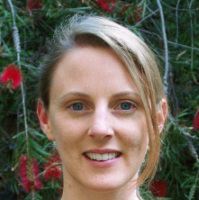
Megan Higgie
My general interests are centred on selective processes that generate divergence in mating display traits and preferences among populations, creating the potential for speciation. More specifically, I am interested in the process of reinforcement and the implications that the resulting reproductive character displacement can have on sexual selection and premating isolation within a species. I finished my PhD at the University of Queensland in 2008 under the supervision of Prof Mark Blows. I was awarded an ARC Post-doc (2009-2011) at the ANU. Here my academic hosts were Scott Keogh and Michael Jennions. I worked on mate choice and preference evolution in a contact zone between lineages of the frog Litoria genimaculata in the Wet Tropics of Queensland. I then took up a lectureship at James Cook University in the School of Marine and Tropical Biology. Here is Megan's webpage
My general interests are centred on selective processes that generate divergence in mating display traits and preferences among populations, creating the potential for speciation. More specifically, I am interested in the process of reinforcement and the implications that the resulting reproductive character displacement can have on sexual selection and premating isolation within a species. I finished my PhD at the University of Queensland in 2008 under the supervision of Prof Mark Blows. I was awarded an ARC Post-doc (2009-2011) at the ANU. Here my academic hosts were Scott Keogh and Michael Jennions. I worked on mate choice and preference evolution in a contact zone between lineages of the frog Litoria genimaculata in the Wet Tropics of Queensland. I then took up a lectureship at James Cook University in the School of Marine and Tropical Biology. Here is Megan's webpage
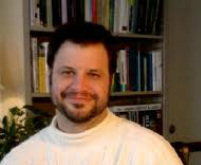
Clint Kelly (NSERC Post doc)
Clint obtained his B.Sc. from the University of Waterloo, MSc. from Mount Allison University (supervisor: Prof. Jean-Guy Godin) and PhD from the University of Toronto (supervisor: Prof. Darryl Gwynne). He completed an NSERC post-doctoral fellowship at the Australian National University with Michael in 2005/6. He was then a Killam Fellow at Dalhousie University (host: Prof. Shelley Adamo). He joined the EEOB faculty at Iowa State University in 2008 and migrated back home in 2013 to join the faculty in the Department of Biological Science at the Université du Quebéc à Montréal. Here is Clint's webpage.
Clint obtained his B.Sc. from the University of Waterloo, MSc. from Mount Allison University (supervisor: Prof. Jean-Guy Godin) and PhD from the University of Toronto (supervisor: Prof. Darryl Gwynne). He completed an NSERC post-doctoral fellowship at the Australian National University with Michael in 2005/6. He was then a Killam Fellow at Dalhousie University (host: Prof. Shelley Adamo). He joined the EEOB faculty at Iowa State University in 2008 and migrated back home in 2013 to join the faculty in the Department of Biological Science at the Université du Quebéc à Montréal. Here is Clint's webpage.

Frances Jacomb (Research Assistant)
I start helping out in the Jennions lab in mid-2014. My original goal was to do an Honours degree with my main supervisor as Dr Luke Holman. This has, however, been deferred for non-academic reasons. BUT - update - I am now doing Honours with Naomi Langmore on a study on brood parasitism! Email me
I start helping out in the Jennions lab in mid-2014. My original goal was to do an Honours degree with my main supervisor as Dr Luke Holman. This has, however, been deferred for non-academic reasons. BUT - update - I am now doing Honours with Naomi Langmore on a study on brood parasitism! Email me
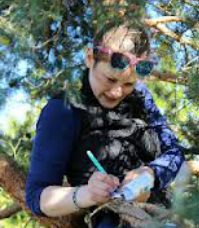
Karoline Fritzsche (Visiting PhD Student )
I did a PhD at Uppsala University in Sweden, where my supervisor was Goran Arnqvist. I visited Michael's lab for 6 months in 2013-14, and again in 2014. Here I wrote up parts of my thesis. I am also collaborating on a modelling project with Jono Henshaw and Andrew Kahn looking at different measures of sexual selection and their reliability in different types of mating systems. In 2015 I started a post-doc at the University of Graz in Austria. Email me
I did a PhD at Uppsala University in Sweden, where my supervisor was Goran Arnqvist. I visited Michael's lab for 6 months in 2013-14, and again in 2014. Here I wrote up parts of my thesis. I am also collaborating on a modelling project with Jono Henshaw and Andrew Kahn looking at different measures of sexual selection and their reliability in different types of mating systems. In 2015 I started a post-doc at the University of Graz in Austria. Email me
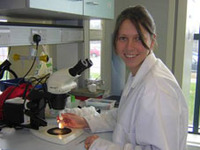
Fleur de Crespigny
My research was in the fields of evolutionary biology and behavioural ecology. I studied the impact of the selfish genetic element, Wolbachia pipientis, on host reproductive strategies and immune function. These studies were undertaken using a variety of insect systems including Drosophila simulans, D. melanogaster and Ephestia keuhniella. Wolbachia causes offspring death (cytoplasmic incompatibility) in crosses between infected males and uninfected females in these species. Wolbachia is of particular interest because it manipulates its host’s reproduction to improve its own transmission. I did a post-doc at the Centre for Ecology & Conservation (University of Exeter) with Nina Wedell. I moved to the ANU in 2008. I now work for the Federal Government in the area of work safety. Email me
My research was in the fields of evolutionary biology and behavioural ecology. I studied the impact of the selfish genetic element, Wolbachia pipientis, on host reproductive strategies and immune function. These studies were undertaken using a variety of insect systems including Drosophila simulans, D. melanogaster and Ephestia keuhniella. Wolbachia causes offspring death (cytoplasmic incompatibility) in crosses between infected males and uninfected females in these species. Wolbachia is of particular interest because it manipulates its host’s reproduction to improve its own transmission. I did a post-doc at the Centre for Ecology & Conservation (University of Exeter) with Nina Wedell. I moved to the ANU in 2008. I now work for the Federal Government in the area of work safety. Email me
Former PhD Students
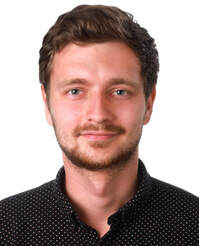
16. Ivan Vinogradov (PhD Student)
I grew up in Russia, but after finishing my high-school I moved to the United States to study biology at University of Massachusetts, Lowell. I specialized mostly in cell culture, but had a strong interest in behavioral biology. After finishing my degree, I made a decision to focus on organismal biology, so what a better place to study that than Australia? I moved to Canberra where I started my Master's degree at ANU. My topic was behavioral lateralization in Mosquitofish and its effects on reproduction. The result study is now published (please go to the J-lab publications (papers 202). IN 2020 I started a PhD co-supervised by Bec Fox and Michael looking at cognition, ageing and inbreeding in mosquitofish. The first paper on inhibitory has now been published (J-lab publications paper 216).
I grew up in Russia, but after finishing my high-school I moved to the United States to study biology at University of Massachusetts, Lowell. I specialized mostly in cell culture, but had a strong interest in behavioral biology. After finishing my degree, I made a decision to focus on organismal biology, so what a better place to study that than Australia? I moved to Canberra where I started my Master's degree at ANU. My topic was behavioral lateralization in Mosquitofish and its effects on reproduction. The result study is now published (please go to the J-lab publications (papers 202). IN 2020 I started a PhD co-supervised by Bec Fox and Michael looking at cognition, ageing and inbreeding in mosquitofish. The first paper on inhibitory has now been published (J-lab publications paper 216).
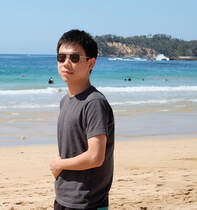
15 Meng-Han (Joseph) Chung (PhD Student)
I completed my bachelor’s degree at the National Chung Hsing University in Taiwan and gained a foundation in osmotic regulation and aerobic metabolism of euryhaline fish. I also accumulated some practical experience working at fish farms and an aquaculture research center to learn how to modify rearing strategies by observing behavioural differences among fishes. The experience sparked my interest in linking my physiology knowledge with the role that behaviour may play in stress adaptation. In my PhD, I looked at genital function and the costs of sperm production and mating effort in Gambusia. To see the first three publications from my PhD please go to the J-lab publications (papers 249 & 252 & 259). I also conducted a large study asking how variation in a stressor (salinity) regulates fish’s body conditions and behaviors (locomotion, mating preference) and further change their fitness.
I completed my bachelor’s degree at the National Chung Hsing University in Taiwan and gained a foundation in osmotic regulation and aerobic metabolism of euryhaline fish. I also accumulated some practical experience working at fish farms and an aquaculture research center to learn how to modify rearing strategies by observing behavioural differences among fishes. The experience sparked my interest in linking my physiology knowledge with the role that behaviour may play in stress adaptation. In my PhD, I looked at genital function and the costs of sperm production and mating effort in Gambusia. To see the first three publications from my PhD please go to the J-lab publications (papers 249 & 252 & 259). I also conducted a large study asking how variation in a stressor (salinity) regulates fish’s body conditions and behaviors (locomotion, mating preference) and further change their fitness.
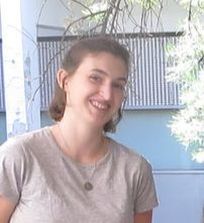
14. Lauren Harrison (PhD Student)
Originally from Brisbane, I did my undergrad and Hons at UQ. I started working in the Jennions lab in mid-2016 supervised by Megan Head. I then went on to do an MSc on the winner-loser effect in Gambusia (and other stuff) which I have now published (see J-lab publications: paper 233). I started my PhD in 2018 and I expanded my work on winner-loser effects, looking at the impact on sperm production in males (paper 269) In addition, I did a major meta-analyses on whether males and females show similar variance in personality traits (paper 264). I also look at female dominance (paper 274), mate choice in fiddler crabs, working with Pat Backwell (paper 264), and sperm traits and temperature (paper 254).
UPDATE: Lauren is now a post doc at the University of East Anglia with Prof Tracy Chapman
Originally from Brisbane, I did my undergrad and Hons at UQ. I started working in the Jennions lab in mid-2016 supervised by Megan Head. I then went on to do an MSc on the winner-loser effect in Gambusia (and other stuff) which I have now published (see J-lab publications: paper 233). I started my PhD in 2018 and I expanded my work on winner-loser effects, looking at the impact on sperm production in males (paper 269) In addition, I did a major meta-analyses on whether males and females show similar variance in personality traits (paper 264). I also look at female dominance (paper 274), mate choice in fiddler crabs, working with Pat Backwell (paper 264), and sperm traits and temperature (paper 254).
UPDATE: Lauren is now a post doc at the University of East Anglia with Prof Tracy Chapman
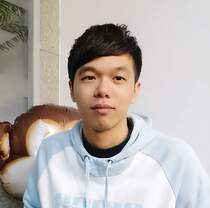
13. Alex Chen (PhD Student)
I grew up in a small township of Central Taiwan which is famous for fruit and flower industries. After watching “Jurassic Park”, I decided to become a palaeontologist. However, my dream was destroyed by knowing that there were no dinosaurs in Taiwan. Soon after I decided to become a marine biologist, instead, because I also love “Jaws”. I completed my Bachelors and Masters at National Taiwan University in Taipei, and my thesis was focusing on the diversity of crustacean in coral reef ecosystems. During my PhD, I intend to connect the energy flows from different trophic levels within a tropical coral reef in Western Australia, by exploring the foraging behaviour of reef fishes, the community structure of invertebrates and the canopy condition of seaweeds. In my spare time, I love seeing movies (I visit the cinema weekly), playing video games (with more than 150 games on Steam) and travel around this beautiful planet (I’ve been to more than 30 countries so far). Feel free to contact me if you wanna talk more. email
I grew up in a small township of Central Taiwan which is famous for fruit and flower industries. After watching “Jurassic Park”, I decided to become a palaeontologist. However, my dream was destroyed by knowing that there were no dinosaurs in Taiwan. Soon after I decided to become a marine biologist, instead, because I also love “Jaws”. I completed my Bachelors and Masters at National Taiwan University in Taipei, and my thesis was focusing on the diversity of crustacean in coral reef ecosystems. During my PhD, I intend to connect the energy flows from different trophic levels within a tropical coral reef in Western Australia, by exploring the foraging behaviour of reef fishes, the community structure of invertebrates and the canopy condition of seaweeds. In my spare time, I love seeing movies (I visit the cinema weekly), playing video games (with more than 150 games on Steam) and travel around this beautiful planet (I’ve been to more than 30 countries so far). Feel free to contact me if you wanna talk more. email
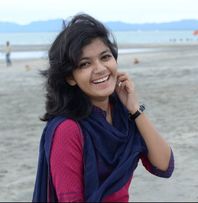
12. Upama Aich (PhD student)
I was born and raised in Bangladesh - a country famous for its people and their hospitality (although, I could be an exception). I studied Zoology for Bachelors (Hons.) and Masters at the University of Dhaka. My Masters work included a study on the colonization of the butterfly Pachliopta aristolochiae and its host plant to understand the role a host plant plays for the development and characterization of this unpalatable (toxic) butterfly. My research interests also covered the status of butterflies and birds in Bangladesh and the study of butterfly diversity in a tropical urban habitat. For my PhD, I will be primarily working with mosquitofish focusing on the effect of male age on their reproductive success. During my time in Canberra, I also need to learn how to ride a bike, learn how to swim and possibly learn how to survive till the end of a PhD. For papers from my PhD see J-lab publications (paper 250, 253, 255, 260. 263, 267).
UPDATE: Upama is now a post-doc at Monash University with Prof Bob Wong.
I was born and raised in Bangladesh - a country famous for its people and their hospitality (although, I could be an exception). I studied Zoology for Bachelors (Hons.) and Masters at the University of Dhaka. My Masters work included a study on the colonization of the butterfly Pachliopta aristolochiae and its host plant to understand the role a host plant plays for the development and characterization of this unpalatable (toxic) butterfly. My research interests also covered the status of butterflies and birds in Bangladesh and the study of butterfly diversity in a tropical urban habitat. For my PhD, I will be primarily working with mosquitofish focusing on the effect of male age on their reproductive success. During my time in Canberra, I also need to learn how to ride a bike, learn how to swim and possibly learn how to survive till the end of a PhD. For papers from my PhD see J-lab publications (paper 250, 253, 255, 260. 263, 267).
UPDATE: Upama is now a post-doc at Monash University with Prof Bob Wong.
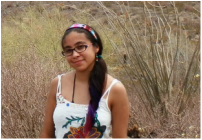
11. Regina Vega Trejo (PhD student)
I grew up in Mexico City, one of the most crowded and yet beautiful cities in the world. I completed a BSc in Biology at the National Autonomous University of Mexico (UNAM) with Oscar Flores. I worked on amphibians and reptiles in an area full of endemics, and with a community who protect their forests. I completed my MSc in Environmental Biology at UNAM with Jaime Zúñiga-Vega. My project looked at selection on morphological traits in toads. The paper is published. I joined the Jennions’ lab to start my PhD in October 2013 (co-supervisor: Pat Backwell). I worked on Gambusia, looking at inbreeding & compensatory growth. My recent papers are on the Publications page. In 2018 I started a post-doc at the University of Stockholm working with Alex Kotraschal Email me
UPDATE: Regina is now a post-doc at Oxford University with Prof Tomas Pizzarri
I grew up in Mexico City, one of the most crowded and yet beautiful cities in the world. I completed a BSc in Biology at the National Autonomous University of Mexico (UNAM) with Oscar Flores. I worked on amphibians and reptiles in an area full of endemics, and with a community who protect their forests. I completed my MSc in Environmental Biology at UNAM with Jaime Zúñiga-Vega. My project looked at selection on morphological traits in toads. The paper is published. I joined the Jennions’ lab to start my PhD in October 2013 (co-supervisor: Pat Backwell). I worked on Gambusia, looking at inbreeding & compensatory growth. My recent papers are on the Publications page. In 2018 I started a post-doc at the University of Stockholm working with Alex Kotraschal Email me
UPDATE: Regina is now a post-doc at Oxford University with Prof Tomas Pizzarri
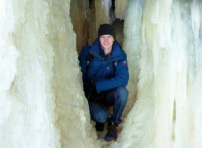
10. Jonathan Henshaw (PhD student)
I did my Honours in 2011-12 supervised by Michael and Hanna Kokko. During the rest of 2012 I traveled the globe. In 2013 I started my PhD with Michael & Hanna as supervisors. I used mathematical models to try to make sense of evolution, with a particular focus on sex allocation, sex roles, mate choice, and gamete competition. My first paper looked at why some species disperse their gametes before fertilisation, while others keep them close to their bodies. My model attempts to explain why some marine animals release both sperm and eggs, while others release only sperm; and why terrestrial plants release pollen but never ovules. My next two papers investigated why some hermaphrodites ‘trade’ eggs. I was awarded my PhD at the end of 2017. Check out my papers and more at Jono's webpage. Email me
UPDATE: Jono is now an academic staff member at the University of Freiburg in Germany
I did my Honours in 2011-12 supervised by Michael and Hanna Kokko. During the rest of 2012 I traveled the globe. In 2013 I started my PhD with Michael & Hanna as supervisors. I used mathematical models to try to make sense of evolution, with a particular focus on sex allocation, sex roles, mate choice, and gamete competition. My first paper looked at why some species disperse their gametes before fertilisation, while others keep them close to their bodies. My model attempts to explain why some marine animals release both sperm and eggs, while others release only sperm; and why terrestrial plants release pollen but never ovules. My next two papers investigated why some hermaphrodites ‘trade’ eggs. I was awarded my PhD at the end of 2017. Check out my papers and more at Jono's webpage. Email me
UPDATE: Jono is now an academic staff member at the University of Freiburg in Germany
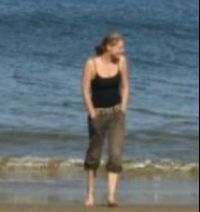
9. Anna Harts (PhD student)
I joined the ANU in 2012 for a PhD supervised by Hanna Kokko. For the last part of my PhD, Michael acted as my local supervisor - but my main academic mentor remained Hanna. My research is focused on the evolution and behavior of sexually reproducing populations. I use mathematical and simulation models to demonstrate the importance of both males and females in relation to mating systems and sexual selection. At the moment I work on two topics, mate-guarding, e.g. how males should optimize their mate-guarding duration in relation to male-male competition and mate availability, and dispersal, how dispersal and local adaptation can influence population demography. Other topics I am interested in include temperature dependent sex determination, parental care, the evolution of viviparity and mate choice. I submitted my PhD in 2015 and now I am doctor. Yahoo!!! Email me
I joined the ANU in 2012 for a PhD supervised by Hanna Kokko. For the last part of my PhD, Michael acted as my local supervisor - but my main academic mentor remained Hanna. My research is focused on the evolution and behavior of sexually reproducing populations. I use mathematical and simulation models to demonstrate the importance of both males and females in relation to mating systems and sexual selection. At the moment I work on two topics, mate-guarding, e.g. how males should optimize their mate-guarding duration in relation to male-male competition and mate availability, and dispersal, how dispersal and local adaptation can influence population demography. Other topics I am interested in include temperature dependent sex determination, parental care, the evolution of viviparity and mate choice. I submitted my PhD in 2015 and now I am doctor. Yahoo!!! Email me
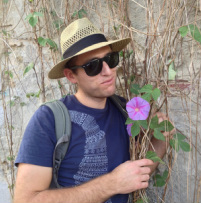
8. Andrew Kahn (PhD student)
I completed my PhD cosupervised by Michael and Hanna Kokko in late 2014. I am interested in sex allocation, parental care and sexual selection. I have combined theoretical modelling with fieldwork on fiddler crabs and field and lab work on Gambusia. For details of my publications, photographs * and so much more please visit Andrew's webpage. In November 2014 I embarked on a career as a high school teacher.
Email me
* OK, I'll admit - this is not the picture Andrew would have chosen for himself, or would he? Who knows? - Michael
I completed my PhD cosupervised by Michael and Hanna Kokko in late 2014. I am interested in sex allocation, parental care and sexual selection. I have combined theoretical modelling with fieldwork on fiddler crabs and field and lab work on Gambusia. For details of my publications, photographs * and so much more please visit Andrew's webpage. In November 2014 I embarked on a career as a high school teacher.
Email me
* OK, I'll admit - this is not the picture Andrew would have chosen for himself, or would he? Who knows? - Michael
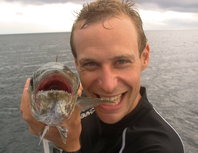
7. Dominique Roche
I am from Montreal, Canada. I completed a BSc in biology at McGill University in 2006. During my undergraduate, I spent a summer on the stunning Caribbean island of Barbados, where I studied fish with Don Kramer. Later, I undertook an MSc with Brian Leung and Mark Torchin in a joint program between McGill University and the Smithsonian Tropical Research Institute in Panama. There, I studied parasites and compared their effects on native and introduced cichlids in the Panama Canal (here on page 4). I thoroughly enjoyed this work but I have always been fascinated by the ocean. I then joined the J lab, where I examined predator-prey interactions in carnivorous species of coral reef fishes. I gained my PhD in early 2014 and then went to Switzerland at the Uni of Neuchatel as a post-doc. Email me.
UPDATE: Dom is now based in Canada and on a three year post doc looking at Open Science website
I am from Montreal, Canada. I completed a BSc in biology at McGill University in 2006. During my undergraduate, I spent a summer on the stunning Caribbean island of Barbados, where I studied fish with Don Kramer. Later, I undertook an MSc with Brian Leung and Mark Torchin in a joint program between McGill University and the Smithsonian Tropical Research Institute in Panama. There, I studied parasites and compared their effects on native and introduced cichlids in the Panama Canal (here on page 4). I thoroughly enjoyed this work but I have always been fascinated by the ocean. I then joined the J lab, where I examined predator-prey interactions in carnivorous species of coral reef fishes. I gained my PhD in early 2014 and then went to Switzerland at the Uni of Neuchatel as a post-doc. Email me.
UPDATE: Dom is now based in Canada and on a three year post doc looking at Open Science website
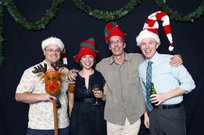
6. Brian Mautz
I did my BSc at the University of California, Riverside in 2004 (Advisor: Marlene Zuk) and an MSc at Illinois State University 2007 with Scott Sakaluk. I started a PhD at the ANU in 2008. Seven projects made up my PhD: Female choice in mosquitofish; a fiddler crab project with Patrica Backwell; male choice in mosquitofish; meta-analyses of (a) genetic benefits of polyandry; (b) sperm & ornaments; human mate choice (the penis paper); and polyandry & sexual harassment in mosquitofish. I finished my PhD in 2012. I then did a post-doc with Howard Rundle (University of Ottawa). I then went to Uppsala, Sweden to work as a post-doc with Alexi Maklakov. Brian's webpage. Email me.
UPDATE: Brian is now working as a statistician for the Pharmaceutical Industry in Phillidelphia.
I did my BSc at the University of California, Riverside in 2004 (Advisor: Marlene Zuk) and an MSc at Illinois State University 2007 with Scott Sakaluk. I started a PhD at the ANU in 2008. Seven projects made up my PhD: Female choice in mosquitofish; a fiddler crab project with Patrica Backwell; male choice in mosquitofish; meta-analyses of (a) genetic benefits of polyandry; (b) sperm & ornaments; human mate choice (the penis paper); and polyandry & sexual harassment in mosquitofish. I finished my PhD in 2012. I then did a post-doc with Howard Rundle (University of Ottawa). I then went to Uppsala, Sweden to work as a post-doc with Alexi Maklakov. Brian's webpage. Email me.
UPDATE: Brian is now working as a statistician for the Pharmaceutical Industry in Phillidelphia.
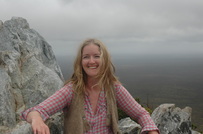
5. Sophie Callander
I did my undergraduate degree at the University of Western Australia, with a Honours degree in Neuroscience. In March 2009 I started my PhD at the ANU with my co-supervisors as Michael Jennions and Patricia Backwell. I completed a project on sexual selection in crickets looking at how male-male interactions affect calling effort; and on male mate choice in Gambusia. Mainly, however, I worked on fiddler crabs with Pat, doing fieldwork in Darwin and Zanzibar. I handed in my thesis in 2012. I am now working in Nature Conservation in Perth, Australia. Email me
I did my undergraduate degree at the University of Western Australia, with a Honours degree in Neuroscience. In March 2009 I started my PhD at the ANU with my co-supervisors as Michael Jennions and Patricia Backwell. I completed a project on sexual selection in crickets looking at how male-male interactions affect calling effort; and on male mate choice in Gambusia. Mainly, however, I worked on fiddler crabs with Pat, doing fieldwork in Darwin and Zanzibar. I handed in my thesis in 2012. I am now working in Nature Conservation in Perth, Australia. Email me
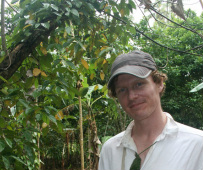
4. Richard Milner
In 2008 I completed my Honours at the ANU with my main supervisor as Patricia Backwell, with co-supervision by Michael Jennions. I was also involved in a number of side projects on crickets with Michael and Jean Drayton. I started a PhD in 2008, again with my main supervisor as Patricia and co-supervision by Michael. We spent three months in 2008 doing fieldwork on fiddler crabs in Mozambique, followed by two months of fieldwork in Darwin. In 2009 I did a full field season in Darwin. In 2010 we headed off to Zanzibar to work on yet another species of fiddler crab, and then went back to Darwin to complete the 2010 field season. In 2011 I wrote up my thesis. It was submitted on Friday 13th, 2012. I now work as an ecologist for Environment ACT. Email me
In 2008 I completed my Honours at the ANU with my main supervisor as Patricia Backwell, with co-supervision by Michael Jennions. I was also involved in a number of side projects on crickets with Michael and Jean Drayton. I started a PhD in 2008, again with my main supervisor as Patricia and co-supervision by Michael. We spent three months in 2008 doing fieldwork on fiddler crabs in Mozambique, followed by two months of fieldwork in Darwin. In 2009 I did a full field season in Darwin. In 2010 we headed off to Zanzibar to work on yet another species of fiddler crab, and then went back to Darwin to complete the 2010 field season. In 2011 I wrote up my thesis. It was submitted on Friday 13th, 2012. I now work as an ecologist for Environment ACT. Email me
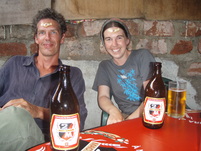
3. Isobel Booksmythe
In 2008 I completed my Honours at the ANU with my main supervisor as Patricia Backwell. I then started a PhD with my main supervisor as Patricia Backwell and co-supervision by Michael. I mainly worked on fiddler crabs, doing fieldwork in Darwin, Mozambique & Zanzibar. I also received an ASSAB grant to work on mate choice in mosquitofish in 2011 in a lab experiment. In 2012 I did a short post doc making measurements on artificially selected lines of Gambusia. My PhD was submitted on Friday 13th, 2012. I then moved to Uppsala for a post-doc with Göran Arqnvist working on seed beetles and on to a postdoc in Zurich with Hanna Kokko. After that I became a DECRA Fellow at Monash University. Isobel's website. Email me.
In 2008 I completed my Honours at the ANU with my main supervisor as Patricia Backwell. I then started a PhD with my main supervisor as Patricia Backwell and co-supervision by Michael. I mainly worked on fiddler crabs, doing fieldwork in Darwin, Mozambique & Zanzibar. I also received an ASSAB grant to work on mate choice in mosquitofish in 2011 in a lab experiment. In 2012 I did a short post doc making measurements on artificially selected lines of Gambusia. My PhD was submitted on Friday 13th, 2012. I then moved to Uppsala for a post-doc with Göran Arqnvist working on seed beetles and on to a postdoc in Zurich with Hanna Kokko. After that I became a DECRA Fellow at Monash University. Isobel's website. Email me.
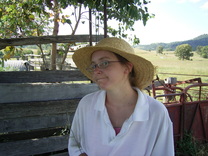
2. Jean Drayton
I grew up in the Hunter Valley. I moved to Armidale for a BSc (Zoology) at the University of New England (UNE). In my second year I did Entomology and was introduced to the wonderful world of bugs and creepy crawlies. After my BSc, I moved from my beloved Armidale (it really is a great place!) to the big smoke in Canberra in 2004 for Honours with Michael. I examined the genetic benefits of polyandry in the black field cricket Teleogryllus commodus. I used a quantitative genetic design to look for evidence of good genes and genetic incompatibility effects. I also examined the effects of inbreeding on various life history traits. This lead into my PhD, which I completed in 2011. I then worked for the Federal Government (DAFF). In 2014 I start a post-doc on dung beetles at UNE. Yes! Email me
I grew up in the Hunter Valley. I moved to Armidale for a BSc (Zoology) at the University of New England (UNE). In my second year I did Entomology and was introduced to the wonderful world of bugs and creepy crawlies. After my BSc, I moved from my beloved Armidale (it really is a great place!) to the big smoke in Canberra in 2004 for Honours with Michael. I examined the genetic benefits of polyandry in the black field cricket Teleogryllus commodus. I used a quantitative genetic design to look for evidence of good genes and genetic incompatibility effects. I also examined the effects of inbreeding on various life history traits. This lead into my PhD, which I completed in 2011. I then worked for the Federal Government (DAFF). In 2014 I start a post-doc on dung beetles at UNE. Yes! Email me
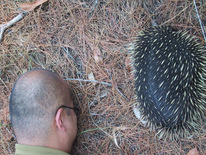
1. Bob Wong
Bob was awarded his PhD on fish mating behaviour and phylogeography in 2004, co-supervised by Michael and Scott Keogh. He then went off to do postdoctoral fellowships in the United States (Gil Rosenthal) and Finland (Kia LIndstrom). Bob returned to Australia and joined Monash as a lecturer in 2006. Bob’s research group focuses on the evolution of animal mating systems and behaviour, and how investment in sex influences reproductive strategies and biological diversity. In recent years, Bob has expanded his research to investigate the impacts of environmental change on animal behaviour and the evolutionary process. Members of Bob’s group conduct research on a wide range of species, from insects to fish. Here is Bob's webpage. Email me
Bob was awarded his PhD on fish mating behaviour and phylogeography in 2004, co-supervised by Michael and Scott Keogh. He then went off to do postdoctoral fellowships in the United States (Gil Rosenthal) and Finland (Kia LIndstrom). Bob returned to Australia and joined Monash as a lecturer in 2006. Bob’s research group focuses on the evolution of animal mating systems and behaviour, and how investment in sex influences reproductive strategies and biological diversity. In recent years, Bob has expanded his research to investigate the impacts of environmental change on animal behaviour and the evolutionary process. Members of Bob’s group conduct research on a wide range of species, from insects to fish. Here is Bob's webpage. Email me
Former Masters students

1. Michelle Shackleton
Michelle was Michael's first student to work on field crickets. She did her Honours with Michael in 2003; and then an MSc on purple spotted gudgeons that was completed in 2007. Michelle is now actively involved with a range of conservation and community action groups. Michelle's Information on LinkedLn
Michelle was Michael's first student to work on field crickets. She did her Honours with Michael in 2003; and then an MSc on purple spotted gudgeons that was completed in 2007. Michelle is now actively involved with a range of conservation and community action groups. Michelle's Information on LinkedLn
Former Honours students
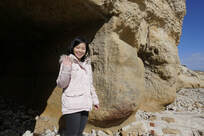
12. Chloe Tan 2020
I grew up in Singapore, but am now in my 3rd year at the Australian National University studying for my undergraduate degree in Biology. Attracted by the J lab website & the promise of fun times and nice people (!), I decided to ask Mike for an undergrad research opportunity. I worked on a project to investigate the potential for male-male mating cooperation in Gambusia (supervised by Mike and Bec). This project introduced me to the wonderful world of experimental work in all its glory (hours of watching videos of behavioural observations and learning how to wash and scrub >500 dirty fish tanks - how can that not be fun?!?). I am now doing Honours supervised by Bec Fox and Michael with a project on humans - details will follow.
I grew up in Singapore, but am now in my 3rd year at the Australian National University studying for my undergraduate degree in Biology. Attracted by the J lab website & the promise of fun times and nice people (!), I decided to ask Mike for an undergrad research opportunity. I worked on a project to investigate the potential for male-male mating cooperation in Gambusia (supervised by Mike and Bec). This project introduced me to the wonderful world of experimental work in all its glory (hours of watching videos of behavioural observations and learning how to wash and scrub >500 dirty fish tanks - how can that not be fun?!?). I am now doing Honours supervised by Bec Fox and Michael with a project on humans - details will follow.
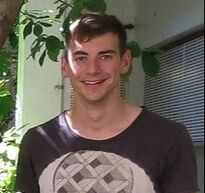
11. Alan Vincent 2018
I completed my undergraduate studies at ANU in 2017, majoring in biology and psychology. A Canberra local, I have recently left the hospitality sector in hopes of pursuing more science related activities. I have begun an Honours year supervised primarily by Megan Head, looking into the effects of the environment on sexual conflict in seed beetles. To the concern of many, I enjoy fixing and riding motorcycles, and regularly jump out of airplanes. Below are two Dispatches I wrote for Evolution describing a study about self fertilisation in algae and another about sexual conflict in seed beetles. |
| ||||||||||||
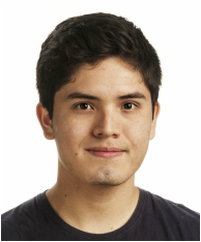
10. Daniel Martinez Escobar 2017
I started my Honours with my main supervisor as Jennie Mallela (Michael is co-supervisor but Jennie is the boss) in the Jennions Lab in February 2016. I investigated the effects of phosphate mining pollution on coral reef building organisms at Christmas Island. I assessed reef growth and destruction parameters to test runoff effects of phosphate mining on the reef. I completed my Honours in mid-2107. I am now writing up the work for publication....
I started my Honours with my main supervisor as Jennie Mallela (Michael is co-supervisor but Jennie is the boss) in the Jennions Lab in February 2016. I investigated the effects of phosphate mining pollution on coral reef building organisms at Christmas Island. I assessed reef growth and destruction parameters to test runoff effects of phosphate mining on the reef. I completed my Honours in mid-2107. I am now writing up the work for publication....
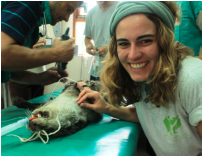
9. Ellen Gearing 2016
I started my Honours with the Jennions lab in mid-2015. I worked on male mate choice and sperm production in Gambusia. Since finishing I have been doing fieldwork in Nambia on baboons, and then worked as a ranger in Klaserie Game Reserve in South Africa.
I started my Honours with the Jennions lab in mid-2015. I worked on male mate choice and sperm production in Gambusia. Since finishing I have been doing fieldwork in Nambia on baboons, and then worked as a ranger in Klaserie Game Reserve in South Africa.
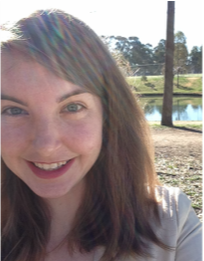
8. Sophie Johns 2016
I started my Honours with the Jennions lab in mid-2015. I modelled the evolution of resistance to sexually transmitted diseases. I then did fieldwork on fiddler crabs in Darwin with Pat Backwell. In 2017 I started a Masters in the J-lab, and spent the first year of my project in Canada working with Sally Otto learning about modelling. Back in Canberra, I modelled the transmission of disease and STIs in organisms and the influence on sexual conflict. I completed in 2018 and have now moved back to Canada (Oh Canada!)
I started my Honours with the Jennions lab in mid-2015. I modelled the evolution of resistance to sexually transmitted diseases. I then did fieldwork on fiddler crabs in Darwin with Pat Backwell. In 2017 I started a Masters in the J-lab, and spent the first year of my project in Canada working with Sally Otto learning about modelling. Back in Canberra, I modelled the transmission of disease and STIs in organisms and the influence on sexual conflict. I completed in 2018 and have now moved back to Canada (Oh Canada!)
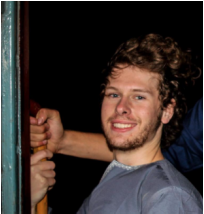
7. Jason Marsh 2015
I started my Honours with the Jennions lab in February 2015. I looked at the effects of inbreeding on male attractiveness and sperm competitiveness in Gambusia. I also worked with Luke Holman on the effects of sexual selection on adaptiveness to the natural (well human-altered) environment in flour beetles.
I started my Honours with the Jennions lab in February 2015. I looked at the effects of inbreeding on male attractiveness and sperm competitiveness in Gambusia. I also worked with Luke Holman on the effects of sexual selection on adaptiveness to the natural (well human-altered) environment in flour beetles.
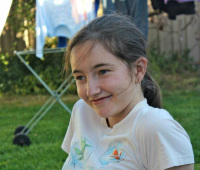
6. Rose O'Dea 2014
I completed my Honours with the Jennions lab in November 2014. I investigated the trend that older/larger mothers often produce larger offspring than predicted by simple optimization models. Using Gambusia as a study species, I experimentally decoupled size and age to disentangle the importance of these two factors (paper 182 at Publications). I also conducted a side project on sperm production - the paper is in J Evol Biol (Publication 173 at Publications). In my spare time I umpired in the Australian Football League*, play piano and bake. I moved to Sydney in 2015, where I did my PhD with Shinichi Nakagawa at UNSW. I submitted my thesis in mid-2020. I am now a post-doc at Melbourne University. email me
* This is top tier. Rose is almost the Australian equivalent of Sian Massey in the English Premier League - Michael
I completed my Honours with the Jennions lab in November 2014. I investigated the trend that older/larger mothers often produce larger offspring than predicted by simple optimization models. Using Gambusia as a study species, I experimentally decoupled size and age to disentangle the importance of these two factors (paper 182 at Publications). I also conducted a side project on sperm production - the paper is in J Evol Biol (Publication 173 at Publications). In my spare time I umpired in the Australian Football League*, play piano and bake. I moved to Sydney in 2015, where I did my PhD with Shinichi Nakagawa at UNSW. I submitted my thesis in mid-2020. I am now a post-doc at Melbourne University. email me
* This is top tier. Rose is almost the Australian equivalent of Sian Massey in the English Premier League - Michael
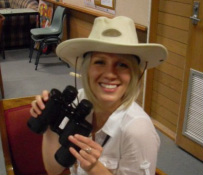
5. Jules Livingston 2011
I completed my Honours in mid 2011 on the quantitative genetics of body size and reproductive traits using Gambusia as a model organism. I observed some interesting sex differences in compensatory growth. In conjunction with Andrew Kahn I also looked at the effect of compensatory growth on male attractiveness. I have published three papers from my Honours (Way to go Jules! - MJ). I started working for the federal government in 2012. At present I am working on farm policy, and I am now based in Melbourne. In my spare time I walk my dogs, dance and do volunteer work.
* Jules received a University Medal for her stellar undergraduate record & quality of her Honours thesis - Michael.
I completed my Honours in mid 2011 on the quantitative genetics of body size and reproductive traits using Gambusia as a model organism. I observed some interesting sex differences in compensatory growth. In conjunction with Andrew Kahn I also looked at the effect of compensatory growth on male attractiveness. I have published three papers from my Honours (Way to go Jules! - MJ). I started working for the federal government in 2012. At present I am working on farm policy, and I am now based in Melbourne. In my spare time I walk my dogs, dance and do volunteer work.
* Jules received a University Medal for her stellar undergraduate record & quality of her Honours thesis - Michael.
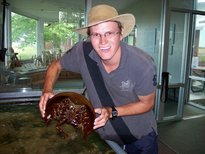
4. Fredrick Hayes 2008
I did my Honours in the J-lab in 2007-2008. I worked on the effect of diet on calling effort and ejaculatory traits in the black field cricketTeleogryllus commodus. We got some cool results. I then took some time off to teach skiing in Canada. I am now working as a biology teacher at Ginninderra College.
I did my Honours in the J-lab in 2007-2008. I worked on the effect of diet on calling effort and ejaculatory traits in the black field cricketTeleogryllus commodus. We got some cool results. I then took some time off to teach skiing in Canada. I am now working as a biology teacher at Ginninderra College.
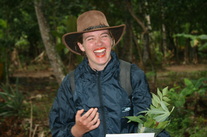
3. Jessica Bolton 2008
I did my Honours at the ANU with my main supervisor as Patricia Backwell and co-supervision by Michael. I started in mid-2008 and finished in mid-2009. I then did three months of fieldwork on fiddler crabs in Mozambique, and two months more fieldwork in Darwin. I also assisted with fieldwork on fiddler crabs in Zanzibar in 2010. I have published four papers. I then worked on conservation issues on Christmas Island. From November 2012, I started working for the Bawinanga Aboriginal Corporation with the Djelk Ranger Group in Arnhem Land. In 2014 I returned to Canberra where I then worked for Environment ACT. I am now living in central Canada. Email me
I did my Honours at the ANU with my main supervisor as Patricia Backwell and co-supervision by Michael. I started in mid-2008 and finished in mid-2009. I then did three months of fieldwork on fiddler crabs in Mozambique, and two months more fieldwork in Darwin. I also assisted with fieldwork on fiddler crabs in Zanzibar in 2010. I have published four papers. I then worked on conservation issues on Christmas Island. From November 2012, I started working for the Bawinanga Aboriginal Corporation with the Djelk Ranger Group in Arnhem Land. In 2014 I returned to Canberra where I then worked for Environment ACT. I am now living in central Canada. Email me
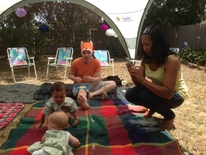
2. Leah Bala 2002
Leah did her Hons with Michael looking at the effect of diet on male calling effort and sperm production in black field crickets. After her Honours, Leah headed overseas to teach english in Japan. She then returned to Canberra to work at CSIRO. Leah is now working for the federal government at HORT in Plant Biosecurity in the Department of Agriculture. Email me
Leah did her Hons with Michael looking at the effect of diet on male calling effort and sperm production in black field crickets. After her Honours, Leah headed overseas to teach english in Japan. She then returned to Canberra to work at CSIRO. Leah is now working for the federal government at HORT in Plant Biosecurity in the Department of Agriculture. Email me

1. Katie Humphrey
If you know where Katie is now, please let us know. Thanks…..
If you know where Katie is now, please let us know. Thanks…..
Former Research Technicians/Associates
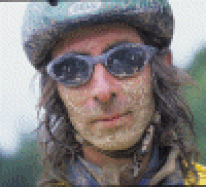
James Davies (Research technician)
I am a very keen cyclist. I probably also hold the world record for the most fish genitalia measured, having measured thousand of gonopodia of Gambusia holbrooki for a long-term artificial selection experiment. I am now working in the Research School of Biology looking after the autoclave system. Email me
I am a very keen cyclist. I probably also hold the world record for the most fish genitalia measured, having measured thousand of gonopodia of Gambusia holbrooki for a long-term artificial selection experiment. I am now working in the Research School of Biology looking after the autoclave system. Email me
|
Jac Davis
I completed my Honours in Psychology at the University of Queensland in 2012, studying the development of practice in humans. I also hold a Bachelor of Business Management from UQ, specialising in research methods and statistics. My current research interests are behavioural economics related to human evolution, and evolutionary explanations for pro- and antisocial behaviour. In the past I have worked on psychology and criminology research projects including a longitudinal study of infant imitation, a policing field experiment, and several systematic reviews and meta-analyses including policing strategies and violent crime in developing countries. In 2013 I worked in the J-lab on a meta-analyses. I am now doing a PhD at the University of Cambridge in the UK. Email me |
